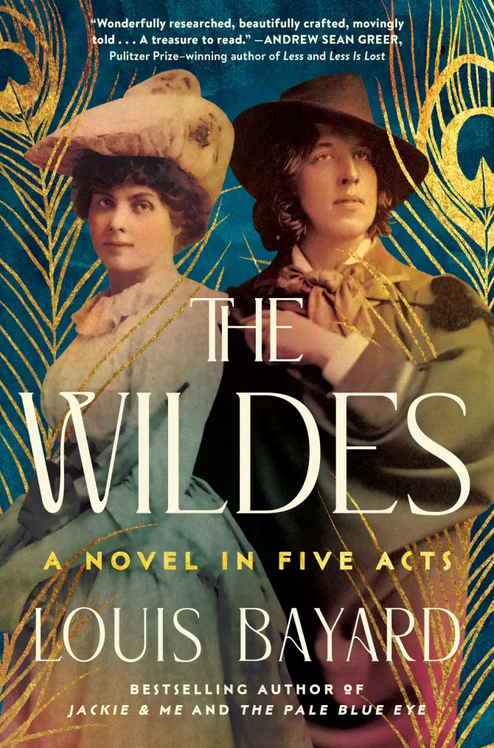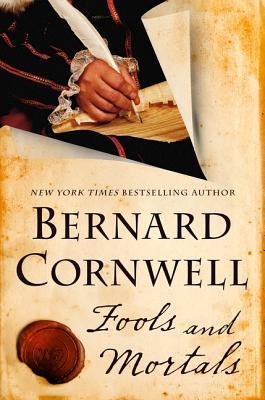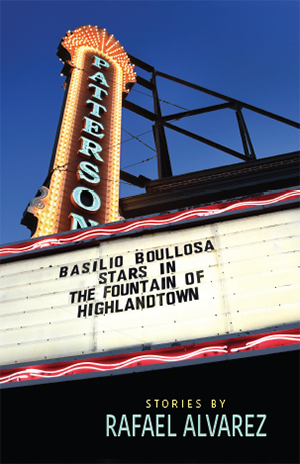The Wildes: A Novel in Five Acts
- By Louis Bayard
- Algonquin Books
- 304 pp.
- Reviewed by Mark Gamin
- September 18, 2024
The rakish Oscar and his family come alive in this smart, moving tale.

Much can the question be mooted, if you’re in the mood: Is historical fiction easier to read or to write than your standard “ahistorical” (for want of a better word) novel? When the book’s cover shows, say, a portrait of Jacqueline Bouvier, familiar to sentient adults of most any age, and displays the title Jackie & Me, the reader pretty much knows the outline of the world he’s about to visit — the time and place, the main characters, some of the outcome.
It’s the construction of the thing that takes a certain imaginative knack or, if you like, genius: an ability to conjure a version of that historical world embroidered around the edges with reshuffled chronology, speculation, and invention appropriate to the author’s creative vision, and to have the thing cohere as much as (or more than) so-called reality.
Louis Bayard is a dab hand at fictionalizing such figures as the aforementioned Jackie O.; Teddy Roosevelt and his son Kermit (Roosevelt’s Beast); 16th-century English astronomer Thomas Harriot (The School of Night); renowned post-French Revolution Parisian detective Vidocq (The Black Tower), and others. (Indeed, he’s even good at fictionalizing the already fictionalized, as he does in Mr. Timothy, a novel whose main character is the grown-up Tiny Tim from Charles Dickens’ A Christmas Carol.)
Bayard’s latest novel, another in a terrific line, is The Wildes. The real-life Irish/English playwright (he tried to downplay the Irish part) Oscar Wilde, a prodigy and a fool, met a tragic end brought on by his own hubris and an affair with Lord Alfred Douglas, his “homme fatal” (an apt coinage of the critic John Lahr).
Douglas, known to all who loved him as “Bosie,” and to all except those who loved him as a simpering, malevolent little twit, was entirely the wrong person to have a homosexual affair with, mainly for two reasons: First, sodomy was a crime in 1890s Britain, and second, Douglas’ father, the marquess of Queensbury, also malevolent, also a twit, made a powerful and dangerous foe.
These and more are the facts, and as well-trod and dreary as they are, they’d be unlikely at this late date to be grist for such a marvelous and beautiful novel, even one from a writer of Bayard’s formidable ability. He gets around that obstacle by making his subject who his title says it is: the Wildes, plural. The Wildean troubles are omnipresent — how could they not be? — but Bayard, a master at imagining characters’ inner workings, delves into how the tragedy and the shame become accepted (almost embraced) parts of each one of them: Oscar, his wife, Constance, their sons Cyril and Vyvyan, Oscar’s magnificent battleax mother, Lady Jane Wilde, and a host of friends and hangers-on.
The Wildes opens idyllically, with the family on holiday in Norfolk “avant la deluge,” as one character later calls the happy time when Oscar was starting to make his flamboyant career in the theater and as a proponent of an aesthetic movement of sorts (for which he was mocked in the English magazine Punch and elsewhere). Enter Bosie, like a succubus.
The dialogue here is what one would expect, full of Wildean wry, ironic apothegms. When Constance, still in the dark about Oscar’s “true nature,” asks why he cannot invite a banker as a houseguest instead of the wan poets he apparently prefers, Bayard, pitch-perfect, has Oscar intone, “Bankers require no help. Indeed, they are the reason that poets do.”
Bayard understands the difference between an intelligent but normal mind like Constance’s and an outsized brain like Oscar’s. In interior monologue, Constance acknowledges that “she must think out the meaning of whatever she’s about to say; [Oscar] finds it at his leisure, as though it were simply dangling from a bough, waiting to be plucked.”
Constance’s gradually dawning awareness of her husband’s proclivities is reminiscent of what happens in 2022’s Jackie & Me, in which, not without mental turmoil, the future first lady comes to realize what she’s getting herself into by marrying into the Kennedy clan but does so anyway. And in 2019’s Courting Mr. Lincoln, Bayard, in another virtuoso turn, delivers a riveting, multilayered tale in which the future Mary Todd Lincoln, not her husband, is the most interesting figure. (In that book, as in all his others, Bayard puts the period details precisely in place — e.g., a group sings “Turkey in the Straw” while aboard one of the first rocking, rolling passenger trains. We in our century don’t belt out the words “high tuck a-haw” nearly enough.)
Maybe The Wildes’ subtitle, “A Novel in Five Acts,” works, or maybe it just distracts. A novel comes in chapters or sections, not acts, and (it should be mentioned) Wilde’s full-length plays were all told in four acts, including his masterpiece, The Importance of Being Earnest, which he was persuaded, to his later rue, to shorten to three. In any event, the Wilde sons each has his own phantasmagorical “act” in The Wildes. In Cyril’s, he ends a war hero (but not the standard kind). Vyvyan, for his part, endures a weird interview with an aging Bosie: “Dorian Gray’s portrait, dragged from the shadows.”
In the story’s final act, everyone is back in Norfolk, and they all — Constance, Oscar, Bosie, and the children — mostly seem to get what they want. (Talk about phantasmagorical.) Come to think of it, perhaps that’s the reason for the fifth act, the kind the playwright himself never penned or likely imagined.
Mark Gamin is a lawyer, writer, editor, and critic. He resides at times in northeastern Ohio and, at other times, in southeastern Ohio.

